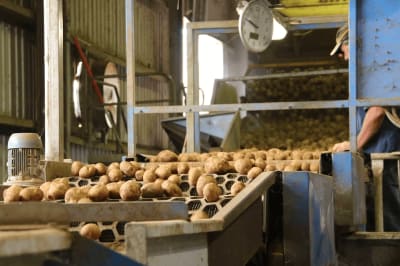Patmore Feeds

We offer a range of pelletised feeds, and strive to supply the agricultural market with high quality livestock nutrition. Along with offering grain growers another avenue to sell their commodities locally.
This case study was originally published in our report,
Funding the Future: Strategies to secure funding for Australian agribusinesses | Download the full report >>
In 2020, Dean Toovey and John Patmore had a bright idea they knew would be good for both farmers and the agricultural prosperity of WA’s wheatbelt.
But how to fund their ambitious plan to build a new pelletised feed mill for cattle, sheep and pigs on farmland owned by the Patmore family in the heart of WA’s wheatbelt at Cuballing, north of Narrogin, was another thing.
“We knew there was a market for pellets because there was a chronic undersupply of pellets for sheep and lambs in the region,” says Dean Toovey, co-founder and now-director of Patmore Feeds.
“But we didn’t know how much a new mill would cost, how to fund it, how much equity would be needed, how to structure the company or how to present the offer to investors; that’s where RSM’s Corporate Finance team was so important in guiding us along the pathway and doing it right from the start.”
The point of difference for Patmore and Toovey was that their greenfield feed mill would be state-of -the-art, highly automated and, being located close to the source of both grain and livestock feed demand, would be able to offer well-priced pellets.
The new mill design was capable of producing 180,000 tonnes of pellets annually. Patmore and Toovey thought they had a rough idea of what it would cost. But once planning, environmental studies, groundwork, finance, design and construction quotes came in, the capital requirement of the total project almost doubled.
“We had a number in our heads as to what we thought it would cost. We just thought then that interested parties would put money in to fund the project, and we would go and build a mill,” recalls Toovey. “But it’s all much more complicated than that. How to structure it all was clearly beyond us. Under RSM’s guidance, we formed a private company, with a board and independent chairman, and went to potential investors seeking funding in return for a shareholding in Patmore Feeds.”
RSM’s Corporate Finance director Justin Audcent said it can be very challenging for a greenfields project to raise funding, especially for a new company with no existing assets or operations.
However RSM quickly realised that there was a strong business case for the new feed mill and worked closely with Dean and John to develop an investable proposition, which included de-risking the project so far as possible, developing robust cash flow forecasts and determining an appropriate funding structure.




